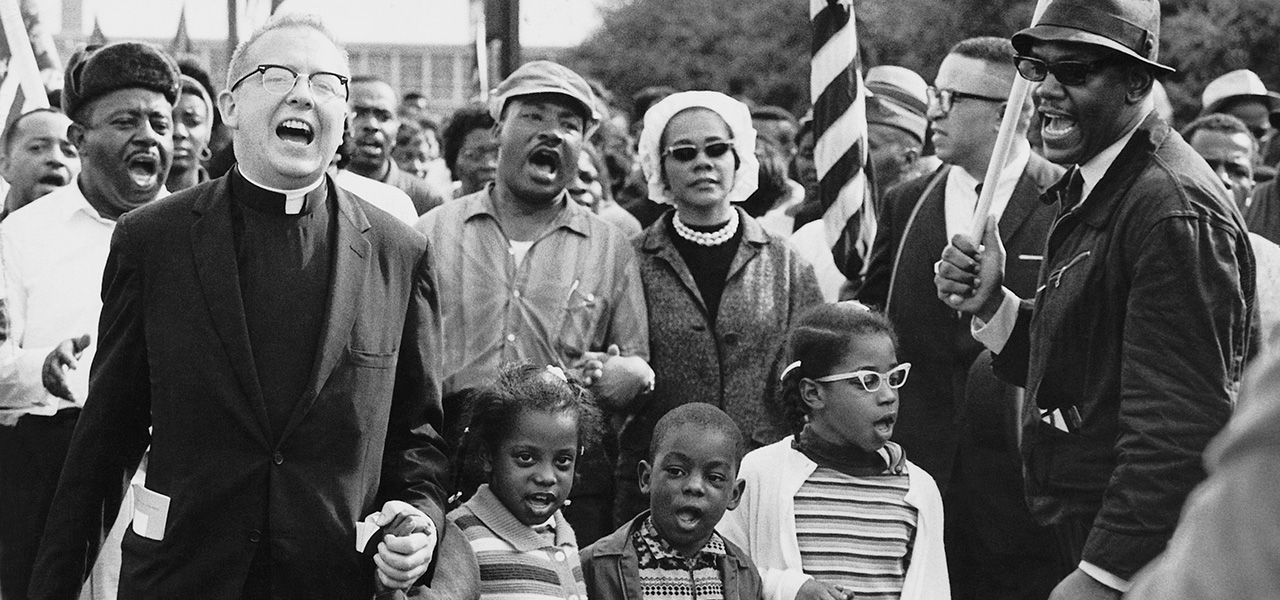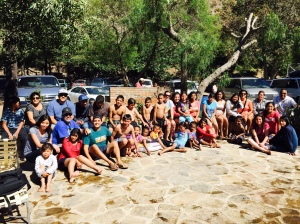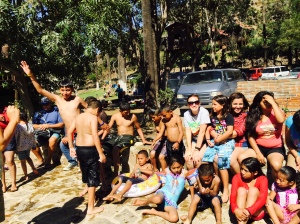
In Pt. 1 of The Spin of Peasants and Kings, I talked about 2 Samuel 21:19 where it says, “Elhanan the son of Jaare-oregim, the Bethlehemite, struck down Goliath the Gittite, the shaft of whose spear was like a weaver’s beam.” (you can read it here) I spoke about how the writer may have been trying to subvert the stories that were being told by those in power. I want to continue looking at how these stories show up, and how they bring questions to what we are used to hearing.
A central part of Israel’s story centers around their captivity and deliverance from slavery in Egypt. As you can imagine, being enslaved left its mark as it would with any nation or people. It’s kind of a big deal. When the children of Israel left Egypt they had a new story to tell and a new role to play in the world. They were told that when a foreigner lived among them, not to mistreat them, and that the foreigner living among them must be treated as a native-born. Love them as yourself (sound familiar?), for you were once foreigners in Egypt (Leviticus 19).
As the nation grew in status and power so did their need to survive. Other nations had kings, governments, armies, and they would too. King David and his son Solomon would mark the height of the nation’s status and power, and what people do with power is always revealing.

The writers of the book of Kings have a knack for not only giving information, but for also throwing jabs in at the same time, sometimes subtly and sometimes not so much. For example, in chapter 4 a list of names are given for those who are appointed as Solomon’s officials. This seems legit, especially as the nation is growing in power, but v. 6 tells us that Adoniram the son of Abda was in charge of the forced labor. Forced what? The word for forced is the same word used in Exodus when the Israelites were ‘enslaved’ by Egypt. What was this slave labor for? Well for one thing, it was used to build the temple! Wait, what!? Slaves were used to build the Temple of the LORD? Yup.
Now, you can go a couple of ways with this information. You can justify it saying, ‘it was normal back then’ and vilify how wicked those slaves really were anyway. Or, you can find this outrageous in light of Israel’s history and see the contrast between the holy and profane. I prefer the latter.
But hey, with this “forced” labor the nation thrived. “Peace reigned (except for the slaves of course), everyone in Israel and Judah lived safe and sound” (1 Kings 4). The nation thrived with an abundance of military power, money, food, and livestock. WooHoo! We’re Number One!
Another jab that the writers make is that it took Solomon 7 years to build the Temple, which seems pretty impressive, until you read the very next verse that says it took Solomon 13 years to build his own palace. Hmmm, Why do you think these two verses are together? If you read on it’s pretty obvious.
Later we read that Pharaoh, king of Egypt, attacked the city of Gezer, burned all its inhabitants to death, then offered it as a wedding gift to his daughter when she married Solomon (1 Kings 9). Some people get wine glasses or toasters for wedding gifts, Solomon got a torched city. And who, pray tell, gave Solomon this gift? The pharaoh of Egypt? Remember Pharaoh? Remember Egypt? You can bet the early writers and readers of the book of Kings did. Throughout this book there is talk of great wealth and strength, at the expense of human life. Building a powerful army with trust in chariots and horses, building a palace and temple on the backs of slaves. It seems there’s a new pharaoh in town, and his name is Solomon.

When the queen of Sheba visits Solomon, she is so impressed with the accumulation of wealth and power (that the previous chapter told us was built by slaves), that she goes on to tell Solomon, “I know why you’ve been given all of this wealth and power, it is to maintain justice and righteousness.” Now, the phrases justice and righteousness, Misha, and sadaqa are interesting Hebrew words. Essentially she says, I know why you’ve been given all this, you’ve been given all this to help those who are downtrodden, to give people opportunities to make the world a better place. Be careful that you don’t just spend all this on yourself, because that would be bad, and it was.
Solomon would go on to break nearly every one of the laws Deuteronomy said that the king shouldn’t do. Acquiring great numbers of horses, taking many wives, accumulating large amounts of silver and gold for themselves, etc…
So how is someone supposed to point all these things out at the height of a nation’s prosperity? You write it down in plain sight. Right next to where it says Solomon was the wisest man around.
There’s nothing in the stories of David and Solomon that surprise me. We see it in our political systems today. I’ve been involved with the “religious world” for over 40 years and have seen a lot of BS from its leaders who act like kings. I’ve also seen some incredibly beautiful things that few will ever know about. What I find refreshing is that the Bible was written by men who had a story they felt needed to be told. It is the human element that I find the most inspirational. Not that King David killed a giant, or didn’t, or that Solomon was so wise, or maybe wasn’t, but that people wrote otherwise and put them in the same book as if to say, y’all figure it out.
If your whole argument for something can fit into a tweet, set of memes, or single thought, I’ve got news for you: it’s probably wrong. Oh, how I wish life were that easy, but it’s not. Wouldn’t it be wonderful if we could just read something without having to wonder whether it is being spun by someone for some reason? Well we can’t, not even in the bible. And believe it or not, I find that refreshing.






 I realize that as much as I don’t like bantering online over controversial or political matters, I still have done it a few times in the blogs I’ve posted. In each that I’ve written I’ve probably prompted more questions than answers, and if you know me, that’s intentional. As Eugene Ionesco, the French playwright said, “It is not the answer that enlightens, but the question.”
I realize that as much as I don’t like bantering online over controversial or political matters, I still have done it a few times in the blogs I’ve posted. In each that I’ve written I’ve probably prompted more questions than answers, and if you know me, that’s intentional. As Eugene Ionesco, the French playwright said, “It is not the answer that enlightens, but the question.” s I just mentioned, remember this: the only way to know when fear (or anger) is manipulating us and narrowing our thought process, is to stop running, breathe, and take the time to reason through the information (smell the flowers). How do we do that?
s I just mentioned, remember this: the only way to know when fear (or anger) is manipulating us and narrowing our thought process, is to stop running, breathe, and take the time to reason through the information (smell the flowers). How do we do that? I think it’s time to ask some obvious questions like; how did the two least liked candidates get nominated to the most powerful position in the world? I believe the answer will point to corruption, control (money) and collusion. We should then ask; why do the voters of this country think there are only these two choices? I believe the answer will again point further into that corruption, control and collusion.
I think it’s time to ask some obvious questions like; how did the two least liked candidates get nominated to the most powerful position in the world? I believe the answer will point to corruption, control (money) and collusion. We should then ask; why do the voters of this country think there are only these two choices? I believe the answer will again point further into that corruption, control and collusion. There are so many things that we can be afraid of: cancer, losing a job, or even politics but I think the thing we really should fear is apathy.
There are so many things that we can be afraid of: cancer, losing a job, or even politics but I think the thing we really should fear is apathy.
 If I could travel into the past to a point of time in my life, I would go back to the moment when my family was about to begin, when my wife was going to give birth to the first two of our four children. I would pull myself aside before entering the delivery room, point to my wife as she lay on the table, look myself in the eyes, and say, “That woman is going to need you now more than ever, for the rest of your life. In fact she is going to need more than you will ever be able to give so you better fall on your knees each day and cry out to God for wisdom, strength, and the ability to point her to the God who is big enough to handle all she will go through. Don’t do it with your words, but with your love, life, and actions. She is going to go to hell and back for this family and you have to be there when she needs someone to help pull her up out of the pit. Trust me when I say she will do the same for you, many times over.”
If I could travel into the past to a point of time in my life, I would go back to the moment when my family was about to begin, when my wife was going to give birth to the first two of our four children. I would pull myself aside before entering the delivery room, point to my wife as she lay on the table, look myself in the eyes, and say, “That woman is going to need you now more than ever, for the rest of your life. In fact she is going to need more than you will ever be able to give so you better fall on your knees each day and cry out to God for wisdom, strength, and the ability to point her to the God who is big enough to handle all she will go through. Don’t do it with your words, but with your love, life, and actions. She is going to go to hell and back for this family and you have to be there when she needs someone to help pull her up out of the pit. Trust me when I say she will do the same for you, many times over.”
